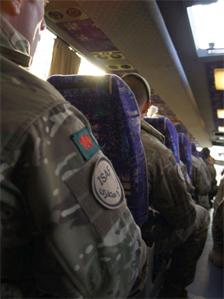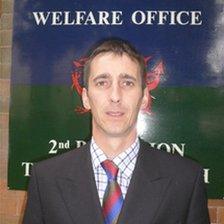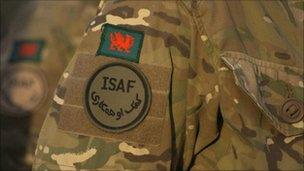How Royal Welsh families handle soldiers' absences
- Published

A Royal Welsh tour in Afghanistan begins and ends with a coach trip
Gareth Jones, who has been on the frontline with Welsh soldiers in recent years, reports for a Radio Wales series, While the Boys Are Away, on how their families cope when their loved ones go away to fight.
At Tidworth's Lucknow Barracks, home to Second Battalion the Royal Welsh, the early arrivals slump amid the tell-tale signs of soldiers on their way to war: piles of Bergen rucksacks, desert boots and helmets.
Men of B Company are snatching some shut-eye or watching music videos and cartoons on a big screen.
Odd things for tough, grown men to be watching, maybe, but this sort of slightly depressing international telly is always on in the background, I've noticed, in the various transit points that mark a soldier's progress into a theatre of war.
At about 2am things liven up with the arrival of the irrepressible Capt "Mo" Moynihan, the Pontypridd-born welfare officer who'll be looking after the families when they are away.
Tonight, he's anxious to get a picture of each soldier before they leave and also for them to record video messages for loved ones.
They aren't as keen, but as a former Regimental Sergeant Major he isn't taking no for an answer. "C'mon boys, this is for your mams and dads. It's the last thing they'll get from you for a couple of weeks."
He tells me he has terrible trouble getting young men to talk to their parents or partners before a tour of duty.
"The boys aren't big on communication. Certain things need to be spoken about, I tell them, like what happens if the worst happens."

Capt 'Mo' Moynihan says it can be hard to get younger soldiers to leave video messages for their family
Some of them, though, have had a torrid, emotional time before arriving here. One young private from Glynneath, Martin Burton, tells me his parents "cried like the rain" as he said goodbye, "but they know how much I love the army."
The married men leave it to the last minute to arrive. Families cope with the night of departure in different ways, adopting various strategies.
L/Cpl Bob Busby, from Wrexham, and his wife Claire, who live in an Army house nearby, tried not to say goodbye at all.
Claire told me later: "I said to him 'I can't say goodbye at the door properly, with a big thing about Afghanistan', so I went to bed, leaving him downstairs.
"But Bob came back up and gave me a kiss. That was the hardest thing - when he was walking out the bedroom waving to the baby."
Pte Mike Allen has turned up looking forlorn.
He and his wife Rebecca had parted a few hours before at their home in Newbridge. Rebecca told me later: "The day he left here, obviously you have got to treat it like it's the last time you're going to see him.
"So I was upset. The baby knew something was wrong so she was upset and Mike was just sobbing. My mother had to take two days off work to look after the baby - because I just cried."
Calm, strong
There was none of that with Sgt Richard Pask, who's just been dropped off by his wife Heather, a nurse.
Sgt Pask, from Cwmbran, was awarded the Military Cross for his courage on an earlier tour in Iraq. "Can't wait to get out there, mate," he tells me. He's one of those calm, strong types.
"He doesn't like being fussed over," Heather told me afterwards. "It was fine, no tears. We just went our separate ways. I am not scared at all. I know 100% he'll come back."
She sounded like she was trying to convince herself rather than me. "No more Military Crosses. I'm hoping he realises he has a family, so no more bravery things, although I'm proud of what he did."

The Royal Welsh are part of international forces providing security in Afghanistan
At 3.30am there's a roll call for the 110 men of B Company. Then, there's the sound of men singing. Not from the Welsh, who are famous for this sort of thing, but from a circle of 12 Fijian members of the company.
A haunting South Sea island hymn, asking for God's protection during the coming tour, fills the night air. The Fijians stick together for support because their families are usually half a world away in the Pacific.
We all pile onto the buses. The padre and the Commanding Officer, Lt Col Mark Wheeler, from Penarth, Vale of Glamorgan, board briefly to wish the troops luck.
Military bases
As we make our way to Brize Norton for the flight to Kandahar, the bus is quiet, except for the sound of Sgt Pask, who's singing along to his iPod.
Many of the others - the younger men especially - look lost in thought, gazing out at the countryside which is now turning pink-grey in the dawn light.
I am struck, as I always am on this journey, by the Cotswold scenery and the fact that so many of the UK's military bases happen to be concentrated in achingly beautiful parts of the country.
It's another one of those cruel juxtapositions of war that our soldiers pass through this calm, rural idyll, accompanied by the sound of early morning birdsong, before embarking for a bloody and unpredictable conflict in a foreign land.
While the Boys are Away is on BBC Radio Wales at 1902 BST on Monday 25 April.